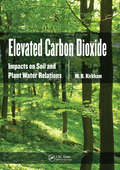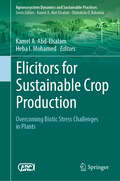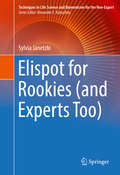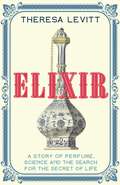- Table View
- List View
Elevate Science, Course 2
by Michael J. Padilla Zipporah Miller Michael E. WysessionNIMAC-sourced textbook
Elevate Science, Course 2, Florida
by Michael J. Padilla Zipporah Miller Michael E. WysessionNIMAC-sourced textbook
Elevate Science, Course 3
by Michael J. Padilla Zipporah Miller Michael E. WysessionNIMAC-sourced textbook
Elevate Science, Grade 2
by Michael J. Padilla Patricia Shehan Campbell Zipporah Miller Michael E. WysessionNIMAC-sourced textbook <P><P>Elevate Science is a comprehensive K-5 science program that focuses on active, student-centered learning. Elevate Science builds students' critical thinking, questioning, and collaboration skills. It fuels interest in STEM and creative problem solving while supporting literacy development for elementary-age learners.--Publisher's website.
Elevate Science, Grade 3, Florida
by Michael Wysession Zipporah Miller Michael PadillaNIMAC-sourced textbook
Elevate Science, Grade 4
by Michael J. Padilla Zipporah Miller Michael E. WysessionNIMAC-sourced textbook
Elevate Science, Grade 5
by Michael J. Padilla Zipporah Miller Michael E. WysessionNIMAC-sourced textbook
Elevate Science, Grade 5, Florida
by Michael J. Padilla Zipporah Miller Michael E. WysessionNIMAC-sourced textbook
Elevate Science, Grade 6
by Michael J. Padilla Zipporah Miller Michael E. WysessionNIMAC-sourced textbook
Elevate Science, Grade 8
by Michael J. Padilla Zipporah Miller Michael E. WysessionNIMAC-sourced textbook
Elevate Science: Earth, Florida
by Michael J. Padilla Zipporah Miller Michael E. WysessionNIMAC-sourced textbook
Elevate Science: Grade 4
by PearsonElevate Science is a comprehensive K-5 science program that focuses on active, student-centered learning. Elevate Science builds students' critical thinking, questioning, and collaboration skills. It fuels interest in STEM and creative problem solving while supporting literacy development for elementary-age learners.
Elevated Carbon Dioxide: Impacts on Soil and Plant Water Relations
by M.B. KirkhamBetween 1958 and 2008, the CO2 concentration in the atmosphere increased from 316 to 385 ppm. Continued increases in CO2 concentration will significantly affect long-term climate change, including variations in agricultural yields. Focusing on this critical issue, Elevated Carbon Dioxide: Impacts on Soil and Plant Water Relations presents research
Eleven
by Paul HanleyThe sweeping changes that make a 'full world' work-involving dual processes of destruction and reconstruction-will transform global culture, agriculture, and ultimately the human race. ELEVEN is a call to consciousness. Only an 'ethical revolution' will allow us to carry forward an ever-advancing civilization.
Elicitors for Sustainable Crop Production: Overcoming Biotic Stress Challenges in Plants (Sustainability Sciences in Asia and Africa)
by Kamel A. Abd-Elsalam Heba I. MohamedThis book covers all aspects of biotic stress, with detailed focus on elicitors to alleviate adverse effects on plant development and growth. Elicitors are substances that can trigger plants to mount defenses against biotic stressors. Exogenous elicitor application prior to stress events modifies transcription factors, enhancing plant resilience. This book explores the role and applications of elicitors that activate a plant's immune system, leading to increased resistance against biotic stressors. This book also explains how elicitors, both abiotic and biotic, can trigger physiological and morphological responses and phytoalexin accumulation. By reducing reliance on harmful pesticides, this guide fosters a more sustainable and environmentally friendly agricultural approach. " This book is a resource for researchers, agricultural professionals, and farmers seeking solutions to combat biotic stress in crops. Whether you're a seasoned grower or just starting out, this book provides practical strategies and insights to safeguard your crops and achieve a healthier, more productive harvest, empowering you to cultivate a thriving future for your crops and the environment.
Elispot for Rookies (and Experts Too)
by Sylvia JanetzkiThis book provides basic, simple, and logical explanations for choices to be made to run the best Elispot possible. It allows the newcomer to truly understand the best options for specific protocol steps, reagents and materials, and provides even the experienced Elispot user with insight into best practices. The techniques presented here are supported by the author's twenty-plus years of first-hand experience working with this assay, as well as the shared experiences of numerous colleagues and collaborators. The enzyme-linked immunospot (Elispot) assay is a widely used technique to monitor cells on the single cell level for the release of analytes like cytokines, chemokines or immunoglobulins (antibodies), in response to particular stimuli. The most important feature of Elispot is its outstanding sensitivity, allowing the detection of specific cells in very low frequencies. The advantages of Elispot have resulted in it being widely adapted for use in research and translational applications in numerous fields including cancer, infectious diseases, autoimmunity, and transplantation.
Elixir
by James O. SyElixir is a thrilling, highly entertaining science fiction novel. It is the first installment of a six-part sci-fi series. Book 1 slowly unfolds the events that lead a college sophomore to discover the powers he possesses, powers that are not of this Earth. This first installment is replete with religious themes and teachings. It also narrates the protagonist’s first encounter with an extraterrestrial being, and how he stumbles upon a miracle cure—an elixir. <P><P>The protagonist’s father and missionary grandparents are used by the author to express his personal religious beliefs and convictions.This first installment of the Elixir series revealed the extreme potency and efficacy of the all-curing magical elixir when used by the mortally wounded extra-terrestrial. But there are very important differences when this alien-manufactured medicine is used by humans. Even the alien scientists working on this miracle drug were amazed and impressed by their findings. They found out about the incredible effects when it was used on some of their human guinea pigs. Much of Book Two of the six-part series will focus on the stupefying results of this wonder drug on humans—and all the good and bad things that might result as a consequence of the relative availability of the elixir. The magical elixir became a much in-demand, much sought-after, ultra-precious and valuable wonder drug. <P> Not wanting to waste a grand opportunity to use these vials of magical elixir to benefit a swath of humanity, Jerry and his young son JT came out with this bold and brilliant move: they would auction off, to the highest bidders, a couple vials of miracle elixir. The brilliance of the plan is in the singularity of its purpose. Its sole purpose is to use the fund generated from the auction to benefit a wide swath of humanity. This is just a prototype, a scaled-down version of a grand vision. Because of the limitations presented by the availability of just a few vials of the miracle drug, a much grander and more magnificent version of the plan would have to wait. Book Two will solve the limited-availability problem of the magical elixir and will unfold the execution of the gloriously magnificent blueprint that the Almighty has planned to serve the poverty-stricken, hopeless, forsaken, and shunned segment of society.
Elixir: A Parisian Perfume House and the Quest for the Secret of Life
by Theresa LevittA story of alchemy in Bohemian Paris, where two scientific outcasts discovered a fundamental distinction between natural and synthetic chemicals that inaugurated an enduring scientific mystery.For centuries, scientists believed that living matter possessed a special quality—a spirit or essence—that differentiated it from nonliving matter. But by the nineteenth century, the scientific consensus was that the building blocks of one were identical to the building blocks of the other. Elixir tells the story of two young chemists who were not convinced, and how their work rewrote the boundary between life and nonlife.In the 1830s, Édouard Laugier and Auguste Laurent were working in Laugier Père et Fils, the oldest perfume house in Paris. By day they prepared the perfumery’s revitalizing elixirs and rejuvenating eaux, drawing on alchemical traditions that equated a plant’s vitality with its aroma. In their spare time they hunted the vital force that promised to reveal the secret to life itself. Their ideas, roundly condemned by established chemists, led to the discovery of structural differences between naturally occurring molecules and their synthetic counterparts, even when the molecules were chemically identical.Scientists still can’t explain this anomaly, but it may point to critical insights concerning the origins of life on Earth. Rich in sparks and smells, brimming with eccentric characters, experimental daring, and the romance of the Bohemian salon, Elixir is a fascinating cultural and scientific history.
Elixir: A Story of Perfume, Science and the Search for the Secret of Life
by Theresa Levitt'Dizzying and fragrant . . . truly a captivating achievement!' Aimee Nezhukumatathil'If you read this book you will be changed . . . this book feels like an actual elixir' Kiese Laymon'A fascinating tale of discovery, wonder, and revolution' Matthew StanleyTwo friends in a Parisian perfume shop make a discovery that will transform our understanding of the world and the origins of life on Earth forever.Set amidst the unforgettable sights and smells of 18th and 19th Century Paris, Elixir tells the story of Edouard Laugier and Auguste Laurent, the son of a perfumer and a fellow aspiring chemist, who met on the Left Bank while pursuing their passion for science. Spurned by the scientific establishment, the pair ended up working out of Edouard's family perfume shop, Laugier père et fils. By day they prepared the revitalizing elixirs and rejuvenating eaux it was famous for, but by night using the ingredients of the perfumery and the principles of alchemy, they pursued the secret of life itself.Elixir reads like a novel, brimming with eccentric characters, experimental daring, and the romance of the Bohemian salon. It is the story of a long-standing scientific puzzle and the struggle to gain acceptance for a new way of thinking about the building blocks of living matter long after those who discovered it were both dead. Yet this is also a story of hope and determination. For while the scientific establishment ridiculed their work at the time, teenage lab assistant Louis Pasteur took it seriously and over the course of an exceptional career, was able to show that their work pointed to a deep, inexplicable asymmetry in the molecular arrangement of living things - an unexplained asymmetry which remains one of science's great mysteries.
Elixir: A Story of Perfume, Science and the Search for the Secret of Life
by Theresa LevittTwo friends in a Parisian perfume shop make a discovery that will transform our understanding of the world and the origins of life on Earth forever.Set amidst the unforgettable sights and smells of 18th and 19th Century Paris, Elixir tells the story of Edouard Laugier and Auguste Laurent, the son of a perfumer and a fellow aspiring chemist, who met on the Left Bank while pursuing their passion for science. Spurned by the scientific establishment, the pair ended up working out of Edouard's family perfume shop, Laugier père et fils. By day they prepared the revitalizing elixirs and rejuvenating eaux it was famous for, but by night using the ingredients of the perfumery and the principles of alchemy, they pursued the secret of life itself. Elixir reads like a novel, brimming with eccentric characters, experimental daring, and the romance of the Bohemian salon. It is the story of a long-standing scientific puzzle and the struggle to gain acceptance for a new way of thinking about the building blocks of living matter long after those who discovered it were both dead. Yet this is also a story of hope and determination. For while the scientific establishment ridiculed their work at the time, teenage lab assistant Louis Pasteur took it seriously and over the course of an exceptional career, was able to show that their work pointed to a deep, inexplicable asymmetry in the molecular arrangement of living things - an unexplained asymmetry which remains one of science's great mysteries.'Dizzying and fragrant, elegant and riveting . . . truly a captivating achievement!' Aimee Nezhukumatathil'If you read this book you will be changed . . . this book feels like an actual elixir. Absolutely stunning' Kiese Laymon(P) 2023 Hodder & Stoughton Limited
Eliza and the Sacred Mountain
by Virginia BernardWhile spending the summer on an archaeological dig in Oaxaca, Mexico, with Uncle Carl and his girlfriend, Eliza Lomax meets a Zapotec boy who takes her back in time to try to stop a deadly game meant to punish her uncle for disturbing the dead.
Elizabeth Blackburn and the Story of Telomeres: Deciphering the Ends of DNA (The\mit Press Ser.)
by Catherine BradyThe story of molecular biologist Elizabeth Blackburn and her groundbreaking research on telomeres and what it reveals about the resourceful opportunism that characterizes the best scientific thinking.Molecular biologist Elizabeth Blackburn—one of Time magazine's 100 “Most Influential People in the World” in 2007—made headlines in 2004 when she was dismissed from the President's Council on Bioethics after objecting to the council's call for a moratorium on stem cell research and protesting the suppression of relevant scientific evidence in its final report. But it is Blackburn's groundbreaking work on telomeric DNA, which launched the field of telomere research, that will have the more profound and long-lasting effect on science and society. In this compelling biography, Catherine Brady tells the story of Elizabeth Blackburn's life and work and the emergence of a new field of scientific research on the specialized ends of chromosomes and the enzyme, telomerase, that extends them. In the early stages of telomere research, telomerase, heralded as a potential cure for cancer and diseases related to aging, attracted the voracious interest of biotech companies. The surrounding hype succeeded in confusing the role of telemorase in extending the life of a cell with a mechanism that might extend the lifespan of an entire organism. In Brady's hands, Blackburn's story reveals much about the tension between pure and applied science, the politicking that makes research science such a competitive field, and the resourceful opportunism that characterizes the best scientific thinking.Brady describes the science accessibly and compellingly. She explores Blackburn's struggle to break down barriers in an elite, male-dominated profession, her role as a mentor to other women scientists (many of whom have made their mark in telomere research), and the collaborative nature of scientific work. This book gives us a vivid portrait of an exceptional woman and a new understanding of the combination of curiosity, imaginative speculation, and aesthetic delight that powers scientific discovery.
Elizabeth, Queen of the Seas
by Lynne Cox Brian FlocaWorld-renowned swimmer and bestselling author Lynne Cox and Caldecott Medal-winning illustrator Brian Floca team up to bring us this inspiring story of an elephant seal who knew exactly where she belonged. Here is the incredible story of Elizabeth, a real-life elephant seal who made her home in the Avon River in the city of Christchurch, New Zealand. When Elizabeth decides to stretch out across a two-lane road, the citizens worry she might get hurt or cause traffic accidents, so a group of volunteers tows her out to sea. But Elizabeth swims all the way back to Christchurch. The volunteers catch her again and again--each time towing her farther, even hundreds of miles away--but, still, Elizabeth finds her way back home. Includes back matter with information about elephant seals.From the Hardcover edition.
Ella persistió en la ciencia: Mujeres brillantes que marcaron la diferencia (She Persisted)
by Chelsea ClintonA STEM-focused addition to the #1 New York Times bestselling She Persisted series! Now available in Spanish!A lo largo de la historia, a las mujeres les han dicho que la ciencia no es para ellas porque no son suficientemente inteligentes, o porque sus cerebros simplemente no son capaces de ese tipo de estudio. En este libro, Chelsea Clinton nos presenta a varias mujeres científicas que no prestaron atención a los que les dijeron que no y optaron por utilizar su ingenio, sus habilidades y su persistencia para descubrir, inventar, crear y explicar. Ella persistió en la ciencia es un libro para todos aquéllos que se han hecho preguntas sobre el mundo que los rodea o sobre cómo funcionan las cosas, y que se niegan a darse por vencidos hasta hallar las respuestas. Las expresivas ilustraciones de Alexandra Boiger que acompañan este inspirador texto muestran a los lectores que todos tenemos el potencial de marcar la diferencia y que las mujeres científicas cambian el mundo.
Ella persistió: Temple Grandin / She Persisted: Temple Grandin
by Lyn Miller-Lachmann Chelsea ClintonInspirado en el bestseller #1 del New York Times Ella persistió de Chelsea Clinton y Alexandra Boiger, llega ahora esta serie en Chapter Books sobre mujeres que sobresalieron, lucharon y se levantaron contra viento y marea. Cuando las vacas, los caballos y otros animales sufrían, Temple Grandin parecía entenderlos mejor que nadie. Temple es autista, y esto determinó que pensara de una manera diferente al resto de las personas; no inferior, solo diferente. Cuando llegó a la edad adulta, se esforzó por explicar cómo el hecho de ser autista influyó en su trabajo y en su vida, ayudando a las personas sin autismo a comprender mejor a las que lo tenían. Temple se convirtió en una científica de renombre mundial, experta en comportamiento animal, y ha utilizado su forma de ver el mundo para inventar y lograr grandes cosas, siempre ayudando a otros en el camino. En este libro biográfico de la galardonada autora Lyn Miller-Lachmann, los lectores aprenden sobre la asombrosa vida de Temple Grandin y cómo persistió. ¡El libro se completa con una introducción de Chelsea Clinton!














